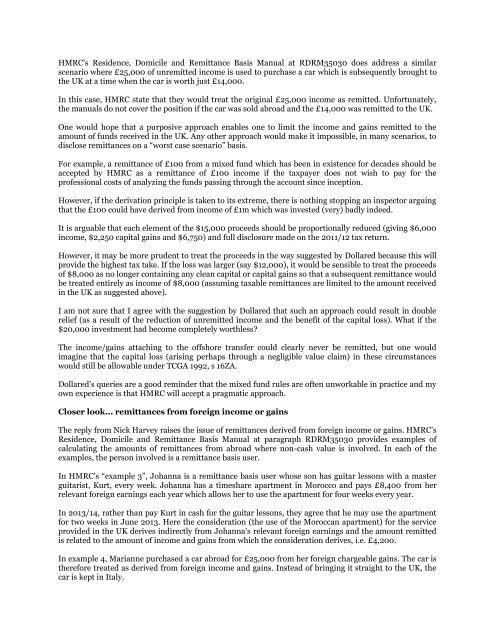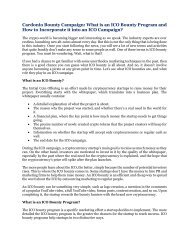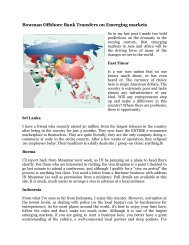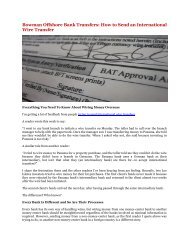Bowman Offshore Bank Transfers on Offshore transfers
Create successful ePaper yourself
Turn your PDF publications into a flip-book with our unique Google optimized e-Paper software.
HMRC’s Residence, Domicile and Remittance Basis Manual at RDRM35030 does address a similar<br />
scenario where £25,000 of unremitted income is used to purchase a car which is subsequently brought to<br />
the UK at a time when the car is worth just £14,000.<br />
In this case, HMRC state that they would treat the original £25,000 income as remitted. Unfortunately,<br />
the manuals do not cover the positi<strong>on</strong> if the car was sold abroad and the £14,000 was remitted to the UK.<br />
One would hope that a purposive approach enables <strong>on</strong>e to limit the income and gains remitted to the<br />
amount of funds received in the UK. Any other approach would make it impossible, in many scenarios, to<br />
disclose remittances <strong>on</strong> a “worst case scenario” basis.<br />
For example, a remittance of £100 from a mixed fund which has been in existence for decades should be<br />
accepted by HMRC as a remittance of £100 income if the taxpayer does not wish to pay for the<br />
professi<strong>on</strong>al costs of analyzing the funds passing through the account since incepti<strong>on</strong>.<br />
However, if the derivati<strong>on</strong> principle is taken to its extreme, there is nothing stopping an inspector arguing<br />
that the £100 could have derived from income of £1m which was invested (very) badly indeed.<br />
It is arguable that each element of the $15,000 proceeds should be proporti<strong>on</strong>ally reduced (giving $6,000<br />
income, $2,250 capital gains and $6,750) and full disclosure made <strong>on</strong> the 2011/12 tax return.<br />
However, it may be more prudent to treat the proceeds in the way suggested by Dollared because this will<br />
provide the highest tax take. If the loss was larger (say $12,000), it would be sensible to treat the proceeds<br />
of $8,000 as no l<strong>on</strong>ger c<strong>on</strong>taining any clean capital or capital gains so that a subsequent remittance would<br />
be treated entirely as income of $8,000 (assuming taxable remittances are limited to the amount received<br />
in the UK as suggested above).<br />
I am not sure that I agree with the suggesti<strong>on</strong> by Dollared that such an approach could result in double<br />
relief (as a result of the reducti<strong>on</strong> of unremitted income and the benefit of the capital loss). What if the<br />
$20,000 investment had become completely worthless?<br />
The income/gains attaching to the offshore transfer could clearly never be remitted, but <strong>on</strong>e would<br />
imagine that the capital loss (arising perhaps through a negligible value claim) in these circumstances<br />
would still be allowable under TCGA 1992, s 16ZA.<br />
Dollared’s queries are a good reminder that the mixed fund rules are often unworkable in practice and my<br />
own experience is that HMRC will accept a pragmatic approach.<br />
Closer look... remittances from foreign income or gains<br />
The reply from Nick Harvey raises the issue of remittances derived from foreign income or gains. HMRC’s<br />
Residence, Domicile and Remittance Basis Manual at paragraph RDRM35030 provides examples of<br />
calculating the amounts of remittances from abroad where n<strong>on</strong>-cash value is involved. In each of the<br />
examples, the pers<strong>on</strong> involved is a remittance basis user.<br />
In HMRC’s “example 3”, Johanna is a remittance basis user whose s<strong>on</strong> has guitar less<strong>on</strong>s with a master<br />
guitarist, Kurt, every week. Johanna has a timeshare apartment in Morocco and pays £8,400 from her<br />
relevant foreign earnings each year which allows her to use the apartment for four weeks every year.<br />
In 2013/14, rather than pay Kurt in cash for the guitar less<strong>on</strong>s, they agree that he may use the apartment<br />
for two weeks in June 2013. Here the c<strong>on</strong>siderati<strong>on</strong> (the use of the Moroccan apartment) for the service<br />
provided in the UK derives indirectly from Johanna’s relevant foreign earnings and the amount remitted<br />
is related to the amount of income and gains from which the c<strong>on</strong>siderati<strong>on</strong> derives, i.e. £4,200.<br />
In example 4, Marianne purchased a car abroad for £25,000 from her foreign chargeable gains. The car is<br />
therefore treated as derived from foreign income and gains. Instead of bringing it straight to the UK, the<br />
car is kept in Italy.






